GBH Read online
ALSO BY TED LEWIS
Get Carter
Jack Carter’s Law
Jack Carter and the Mafia Pigeon
Copyright © 1980, 2015 by the Estate of Edward Lewis
Published by
Soho Press, Inc.
853 Broadway
New York, NY 10003
Library of Congress Cataloging-in-Publication Data
Lewis, Ted, 1940–1982.
[Grievous bodily harm]
GBH / Ted Lewis.
1. Criminals—England—London—Fiction. I. Title.
PR6062.E955G74 2015
823’.914—dc23 2014033183
ISBN 978-1-61695-550-2
PB ISBN 978-1-61695-646-2
eISBN 978-1-61695-551-9
v3.1
Contents
Cover
Other Books by This Author
Title Page
Copyright
The Sea
The Smoke
The Sea
The Smoke
The Sea
The Smoke
The Sea
The Smoke
The Sea
The Smoke
The Sea
The Smoke
The Sea
The Smoke
The Sea
The Smoke
The Sea
The Smoke
The Sea
The Smoke
The Sea
The Smoke
The Sea
The Smoke
The Sea
The Smoke
The Sea
The Smoke
The Sea
The Smoke
The Sea
The Smoke
The Sea
The Smoke
The Sea
The Smoke
The Sea
The Smoke
The Sea
The Smoke
The Sea
The Smoke
The Sea
The Smoke
The Sea
The Smoke
The Sea
The Smoke
The Sea
The Smoke
The Sea
The Smoke
The Sea
The Smoke
The Sea
The Smoke
The Sea
The Smoke
The Sea
The Smoke
The Sea
The Smoke
The Sea
The Smoke
The Sea
The Smoke
The Sea
The Smoke
The Sea
The Smoke
The Sea
The Smoke
The Sea
The Smoke
The Sea
The Smoke
The Sea
The Smoke
The Sea
The Smoke
The Sea
The Smoke
The Sea
The Smoke
The Sea
The Smoke
The Sea
The Smoke
The Sea
The Smoke
The Sea
The Smoke
The Sea
The Smoke
The Sea
The Smoke
The Sea
The Smoke
The Sea
The Smoke
The Sea
The Smoke
The Sea
The Smoke
The Sea
The Smoke
The Sea
The Smoke
The Sea
The Smoke
The Sea
The Smoke
The Sea
The Smoke
The Sea
Afterword
G.B.H.
1861. Section 18. Offences Against the Person Act:
“Whosoever shall unlawfully and maliciously by any means whatsoever wound or cause any Grievous Bodily Harm to any person … with intent … to do some … Grievous Bodily Harm to any person, or with intent to resist or prevent the lawful apprehension or detaining of any person … shall be liable to ‘imprisonment only’ … for life.”
Amended 1967, Section 10 (2), Schedule 3.
THE SEA
A DRY LIGHT WIND ripples softly across the coastal plain, murmuring round the bungalow’s corners, bound for the sanddunes and the shuddering brittle grass.
From the bed, I stare through the window and watch some shreds of cloud pass luminously across the face of the moon. The clouds move on and the moon is solitary once more, its brilliance sharply defining the bedroom’s details. A mile away, the sea is subdued as it tumbles on to the flat, hard beach. I look at my watch. It is a quarter to three.
I pick up the handgun off the bedside table and get up off the bed and walk from the bedroom into the large bare L-shaped hall. The moonlight casts the shadow of the open staircase leading to the loft, deep black on the plain linoleum floor. The floor feels unexpectedly warm beneath my bare feet. I walk towards the front door, my approach causing the moonlight to ripple beyond the frosted glass.
I draw back the bolt, unlock the door and open it slightly, quietly. The warm night wind hesitates in the doorway for a moment, then laps over my naked body. For a few moments I remain motionless, then I slowly pull the door until it’s fully open. Then I listen.
There is only the soft noise from the shore and the night rustlings from the gorse and the copses and from the hedgeless water meadows that stretch away as far as the horizon. I step forward on to the tiled steps. I look to my left. Three miles away the lights of the gas terminal are brilliantly clear in the night’s stillness, like a city centre without any suburbs.
I go back into the bungalow and lock and bolt the door behind me.
In the large lounge, the curtainless windows make it unnecessary for me to switch on the light. I climb the open-tread steps and walk over to the drinks and pour myself a brandy and ginger. I put the gun down on the piano and in the darkness I light a cigarette.
THE SMOKE
SAMMY OPENED THE DOOR, which surprised me, even though he was expecting me. Sammy goes through life as if he’s always expecting both barrels. That being so, I’d expected his old lady. And even when he’d clocked it was me and not a different urban gorilla, his squitty little eyes swivelled this way and that, trying to fathom the Hammersmith darkness beyond the relatively large shapes of Jean and myself. What he expected to be backing us up I do not know.
Sammy stepped back and held the door open and Jean and I removed our shadows from the tatty Georgian columns and entered the yellow light that did not do a lot for Sammy’s undecorated hall. Nor, when it came down to it, for Sammy’s complexion.
“I got rid of Margaret and the kids,” he said. “The place is clear.”
“That’s right, Sammy,” I said. As if it wouldn’t have been.
Sammy backed along the wall beyond the foot of the staircase, stopped his slithering against the first door on the left.
“I’m here,” he said.
“Thanks,” I said to him.
Jean looked at me, signalling her opinion of Sammy with an icy smile, and walked through the doorway. I began to follow her, but my progress was arrested more by the expression in Sammy’s eyes than by anything of a more physical nature.
“Mr. Fowler,” said Sammy, “I got to tell you. I don’t like none of this. No way do I like none of it.”
I looked at him.
“I just wanted to tell you that,” he said, wishing he wasn’t having to endorse what he had already said.
“Why?” I asked, and maintained the look and the longer I maintained it the less inclined Sammy was to reply. Relenting I said to him, “You don’t have to stay. You can piss off dow
n the boozer. Tell Harry for you to use my slate. Or then again, you can clear off upstairs and watch the match on TV.”
“Oh, no. I wouldn’t be able to turn the volume loud enough.”
“In that case,” I said to him, “it’s down to the boozer, isn’t it?”
A short silence. Then Sammy said, “Yeah. That’s what I’ll do, Mr. Fowler. I’ll nick off down there and take advantage of your kind offer.”
As if he’d come to that conclusion all by himself.
“Good,” I told him.
I walked through the door and into the room.
Jean was standing by the bay window, lighting a cigarette. The drawn curtains were hidden behind the blankets which had been hung from the curtain’s rufflettes. Also as per instructions, the carpet had been turned right back, and on the bare boards in the centre of the room an upright chair stood on its own. Facing the chair was a cheap divan. Next to the divan was a folding card table and on this table was a bottle of scotch, a bottle of vodka, some tonics, some ginger ales, and some glasses. Also on this table stood a table lamp, providing the room’s illumination, the central light socket being, for the moment, otherwise engaged. On the floor, next to the folding table, was an aluminium bucket full of water. Next to the bucket, on the floor, was the other equipment.
I clocked all this, and then I looked at Jean, only to find that she was already looking at me. Our gazes, though apparently blank, transmitted our mutual feelings.
In the doorway, Sammy appeared, putting on his overcoat.
“Well,” he said, “I’ll be on my way then.”
We both looked at him.
“I think everything’s like what you said.”
“Looks like it, Sammy.”
“Right then, I’ll be off, then.”
He paused for a moment, like an amateur dramatic waiting to be cued off stage. Then he disappeared, and there was the sound of the front door closing.
After he’d gone, Jean said, “You think Mickey’ll be on time?”
“I’d say so. He put the collar on Arthur at quarter to seven.”
Jean looked at her watch. The ash broke from her cigarette and fell to the floor. “I think I’ll have a drink while I’m waiting,” she said.
I turned to the card table and poured vodka for Jean and scotch for myself. I carried her drink over to her and while I was handing it to her the doorbell rang. Jean didn’t look at me as she took the glass from me.
I went out of the room and opened the front door. Immediately in front of me stood Arthur Philips, age early forties, hairstyle late fifties. His open-neck shirt was terylene and the suit Burton modern. Behind Arthur stood Mickey Brice, the yellow light pinpointed in his dark glasses like the eyes of Morlocks.
“Hello, Arthur,” I said.
“Mr. Fowler, look—”
“In a minute or two,” I told him. “Come inside first.”
Behind him, Mickey began to move forward, and when Mickey does that—if you’re in front of him—you have no option but to move forward as well, which is what Arthur Philips did. I turned away and Arthur followed me along the hall and into the room. Mickey closed the door behind us all.
“Hello, Jean,” Arthur said.
“Arthur,” Jean replied.
I stood next to the card table.
“Like a drink, Arthur?”
“Yeah, George. Yeah. I’ll have a scotch.”
I poured him a scotch.
“Anything with it?”
“No, thanks. As it comes.”
I handed him his drink.
“Thanks.”
He knocked off half of it in one go.
“Want to sit down, Arthur?”
Now Arthur was no longer able to avoid looking at the solitary chair.
“Look, Mr. Fowler, I shouldn’t be here at all. Not at all. There’s nothing I can tell you.”
Mickey Brice went over to the chair and shifted it a couple of inches, underlining the point of my request to Arthur. Arthur knocked off the remainder of his scotch and went and sat down. Mickey Brice remained standing behind the chair. From his new vantage point, Arthur now had a better view of the accessories that lay beside the aluminum bucket.
“Why don’t you start by giving us what you can?” I said, refilling his glass.
Again, Arthur swallowed the first half.
“You know what I can tell you.”
“Why not tell us again?”
Jean walked over to the card table and topped herself up. Arthur breathed in deeply.
“Well. Of course, I know all about the job, I mean. There was Lenny White, Tommy Coleman, Maurice Hutton, Billy McClean. So the job goes right. Well, it would, with them on it, wouldn’t it? And the finance, well, it had to come from you, with that pedigree, right? Your law knows that, and the Heroes, they know it, too. They know who to collar, but of course they can’t, it being Sellotaped up, as always is.”
Arthur punctuated his monologue with another belt of scotch.
“But the Heroes pull in Tommy Coleman anyway, and it’s not just for show because they roll out two witnesses contradicting the time and location of Tommy’s fairy tale. So he’s still down there and him and the Heroes are still talking to each other.”
“Which leads us to suppose?”
“Well, whoever the convener is, it’s got to be one of the workers. Somebody what knows what the rest of the community knows.”
“That’s right. So why should one of the workers want to speak out against the union?”
Nothing from Arthur except silence.
“Arthur?”
“Well, one of the Heroes could go to one of the workers in the way they sometimes do, and say to the worker, look, I know you weren’t on that job, but it was your kind of job, and you know who was on it, and if I wanted to, I could fit you up for being on the job you weren’t on, so how about it?”
There was no response from any of us. Arthur broke the silence by downing the remains of his drink.
“Give Arthur another one, Mickey,” I said.
Mickey took the glass from Arthur’s hand and as he walked to the card table he brushed against the wires that hung down from the central light socket. They swayed towards Arthur. He leant away from them as though they were poisonous snakes about to strike. Which, in a manner of speaking, they were.
Mickey gave Arthur his glass back.
“Well, that’s what you told Mickey previously,” I said. “Which is fair enough, because I said you could do that. But now I’d like to hear a different story.”
“I can’t tell you anything else,” Arthur said, looking into my face. “Honest.”
“You haven’t got a different story?”
Arthur shook his head.
“Pity.”
I went over to the drinks and poured myself another one. The silence in the room was terrific. I splashed ginger ale on top of the whisky.
“Take your pants off, Arthur.”
“Mr. Fowler,” Arthur said, “I’m straight up. Honest I am.”
“Do it for him,” I told Mickey.
“Listen—”
Mickey cut Arthur’s sentence short by going to work on him. When I turned round from the table Arthur’s trousers and underpants were round his knees. Mickey took the glass from Arthur’s hand and put it back on the card table and then he picked up the short strands of rope from next to the bucket and tied Arthur’s ankles to the chair legs and his arms behind the chair back. After he’d done that Mickey moved the bucket a little closer to where Arthur was, causing a few drops of water to jump over the bucket’s rim and slop down on to the bare floorboards. Then Mickey taped Arthur’s mouth shut with some gauze and plaster.
“We’ll give it a go with the gag a couple of times, Arthur,” said Mickey Brice. “You’ll scream, and you’ll want us to take it off so we’ll be able to hear you scream and tell Mr. Fowler what he wants to know. But we won’t do that at first. Like I say, we’ll give it a couple or three goes so you can get
used to it.”
Mickey took his gloves from his pocket and put them on, then gathered the dangling wires to him, taking hold of them not quite at their naked ends. I was suddenly conscious of Jean’s perfume as she moved very quietly to stand by my side. Now the games were over.
THE SEA
EVEN JEAN DOESN’T KNOW about the bungalow.
Didn’t know.
It’s been in existence for seven years. Nobody in the area knows who it belongs to. Not even the builder, nor the agent I went through. Of course there was a name on the cheques they got, nice cheques that encouraged them to comply with my specifications and furnishings and deadlines. I’ve only been here four times since it was built, which in a way is a pity; it’s really very nice indeed. And when I’m not in residence, the arrangement is that the agent takes care of its maintenance. When I am, a phone call tells him not to, and another phone call reactivates him when I’ve gone.
In the specifications the safe was naturally of extreme importance, as was the cellar. Over the phone the agent once asked jokingly, when he was informed of the cellar’s specifications, if I knew something about the state of détente the President of the United States didn’t. I didn’t mind him having his little joke. But I did tell him that I considered the amount of money he was being paid entitled me to the rights in his material. After that he maintained a seriousness appropriate to the business in hand.
From the outside, the place doesn’t look much, what you can see of it beyond the remains of the copse. There are two bedrooms. The lounge runs the whole length of the house, the side that faces east, looking over the lumpy flatness of the gorse and the mild ripples of the sand dunes beyond and the unseen lapping of the sea made distant by the enormous expanse of unmarked sand that stretches a quarter of a mile from the dunes before it is troubled by the sea’s first overlap. All this seen and unseen is witnessed through a window of dimensions similar to the one in the Penthouse. Only the aspects are different.
When you walk into the lounge, this window is to your left, but its sill, if you are of average height, about a foot above your eye level. But then when you cross the room’s first space and climb the broad open-tread staircase to the room’s second, broader level, the base of the window is level with the welts of your shoes, if you’re wearing any. Academic, really. After the builders had gone home, myself apart, only the agent and the agent’s man had ever set foot in the place.

 All the Way Home and All the Night Through
All the Way Home and All the Night Through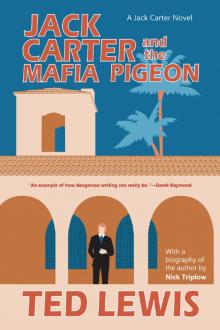 Jack Carter and the Mafia Pigeon
Jack Carter and the Mafia Pigeon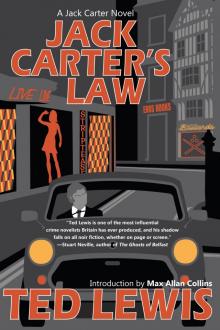 Jack Carter's Law
Jack Carter's Law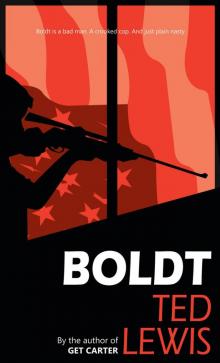 Boldt
Boldt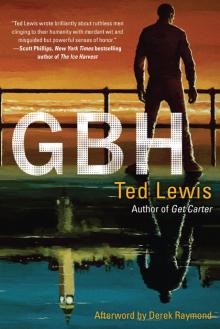 GBH
GBH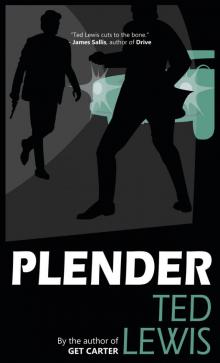 Plender
Plender The Rabbit
The Rabbit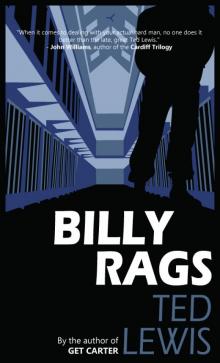 Billy Rags
Billy Rags